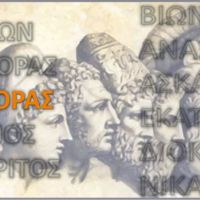Protagoras of Avdira
Point Item Type Metadata
Latitude
Longitude
MobileContent
SpeechContent
Entrance
TextDuration
Characterization
ThesaurusLink
ThesaurusContent
Protagoras from Avdira, synchronous to Democritus, was a thinker, educator and a rhetor, one of the greatest philosophers of ancient times and the most important representative of sophistry. He lived during the 5th century B.C. (about 485 ? 411 B.C.), a time of great events and changes in the life and thought of the ancient Hellenism, during which Greek though was turning to the mythological and logical interpretation of the world, life and society.
After his journeys, he taught young people in the whole Greek world of his time and then ended in Athens in the middle of the 5th century, where he developed his ideas, gaining Pericles? and Euripides? friendship ?in Euripides? dramas we can trace his influence. During this period he was famous as a political thinker. Pericles assigned him the writing of the constitution, the basic state law for the panhellenic colony of Thourii in Loukania, in southern Italy (446-444 B.C.).
He became known in the history of philosophical thought through his Platonic dialogues where his arguments are presented in order to get disapproved. Protagoras was the first one who introduced the concept of relativism and subjectivism in philosophy. He used Heraclitus? lessons on fluidity and movement of everything to establish his theory on what is knowledge. Truth is not personal but universal and knowledge is not defined objectively but it is based on senses. People?s values are conventional concepts and their content is defined by society and the moment in its history. This particular philosophical point of Protagoras was criticized by researchers because Protagoras was considered staying in the area of senses and did not move on to the area of mind where all stable measures of knowledge exist.
Protagoras was a pragmatist, a researcher of reality, and considered man as its judge, an interpreter and creator. At this point the concept of humanism is introduced: Man is the measure for everything. For those which exist a measure that they exist and for those that do not exist a measure that they do not exist. There is no objective truth valid for everyone. Every man defines the measure of things, truth. A Criterion for truth is the subjective perception and experience, meaning that a man?s opinion is not more valid than from the opinion of someone else and that every subjective point of view has its value. The only authentic criterion for appraising reality is every man separately in the frame of skepticism and relativism.
Protagoras believed in the evolvable of human culture, especially of the social and political life ?starting from the most incomplete forms and reaching the perfect ones. He taught that a man can create himself during learning, exercising and trying from a young age. He considered that virtue can be taught as long as man is properly endued. Practice of virtue is a means of political action and of evolution of humanity in upper levels of culture.
Additionally, Protagoras lectured on agnosticism that was related to the concept of gods. He points out in his work ?Peri theon? [On gods]: I do not know if gods exist or not and I have no idea what kind of creatures they are. He is one of the firsts who confronted the existence of god with a critical thought, considering that the absence of presence of the gods and the shortness of human life work as an obstacle for human knowledge. Obviously Protagoras was not an atheist, but he thought that the senses allow humans to acknowledge the dubious, those that the senses and mind cannot approach, since the shortness of human life does not offer humans the necessary time to go deeper in such cases.
Many of the Protagoras? aspects, like Plato?s, seemed daring and were questioned by his contemporaneous. These aspects consisted of a reason for controversies, misinterpretations and fertile discussions till today. Protagoras taught in Athens till 411 B.C., when he was accused of atheism and was forced to abandon the city and go to Cicely. The ship sank and the sophist was drawn, according to the Athenian annalist Philochoros.
His works were important but only abstracts of it are saved along with the titles of his writings: ?Peri theon? [On gods], ?Alithia I katavalodes? [Truth or spending], ?Peri tin en archi katastaseos? [On the beginning situation] and ?Antilogie? [disputation]. Protagoras believed that for every subject there are always two conflicting aspects. These are the renowned double speeches which influenced not only rhetoricians but tragic poets also. He first taught the grammatical rules for nouns and verbs and the syntactic rules for sentences. His pedagogical values can be found in his writings ?Peri areton? [On virtues]. His work became famous and had a great influence in posterior thinkers. His contestant, Plato, is the most important source of information.
Files
Collection
Citation
Item Relations
| This Item | dcterms:isPartOf | Item: Archaeological site of Avdira |

